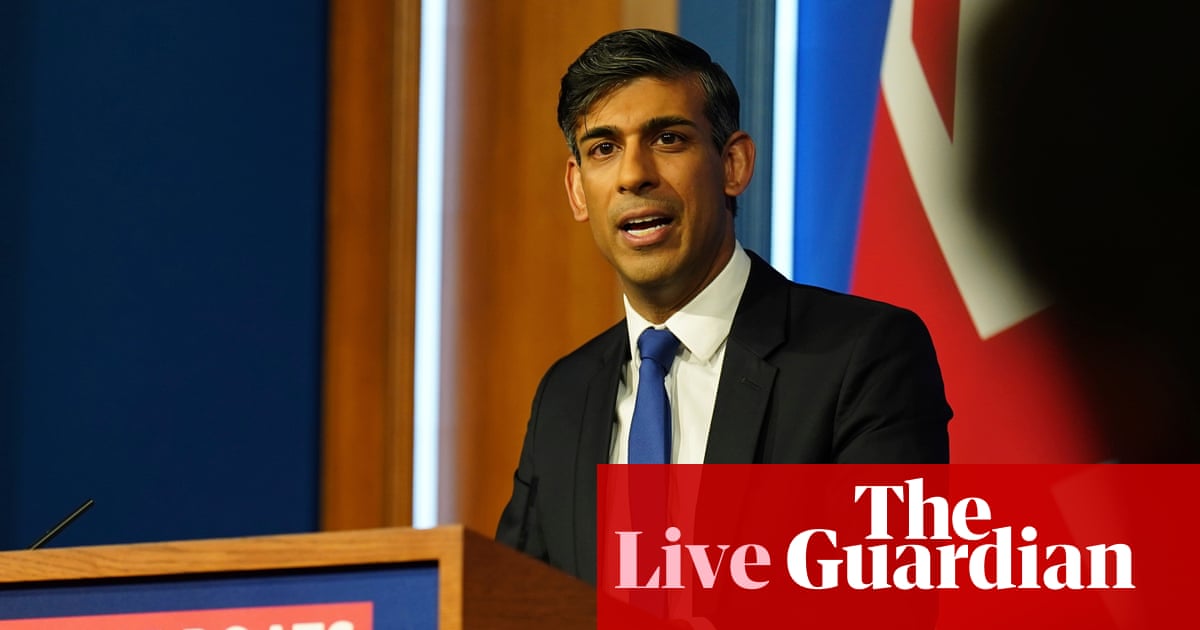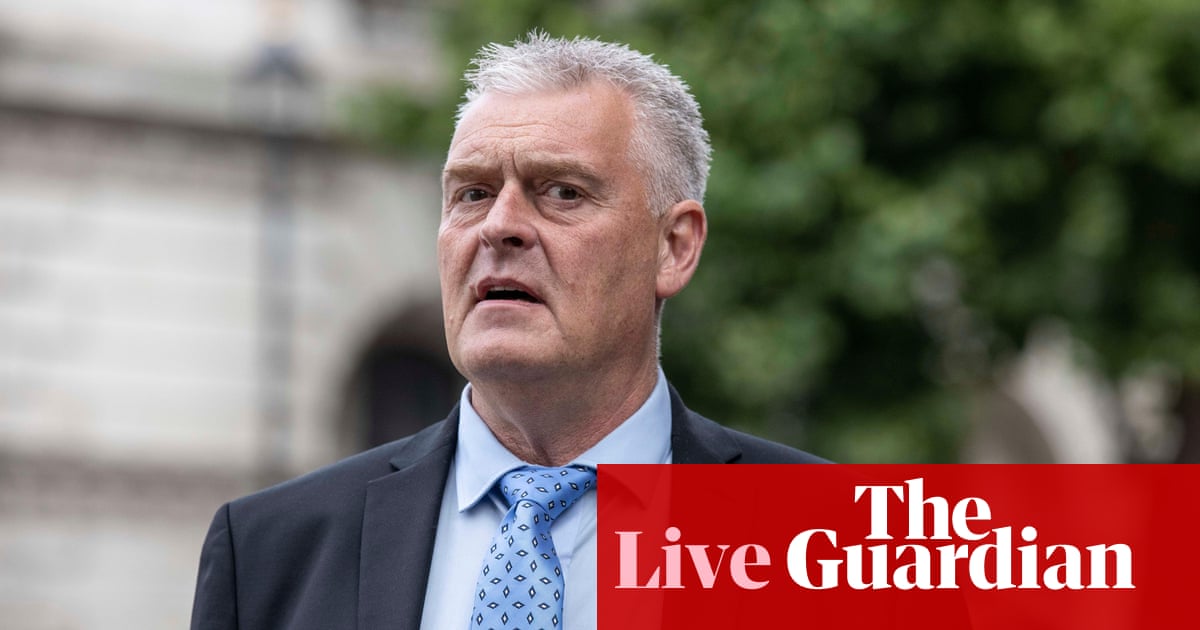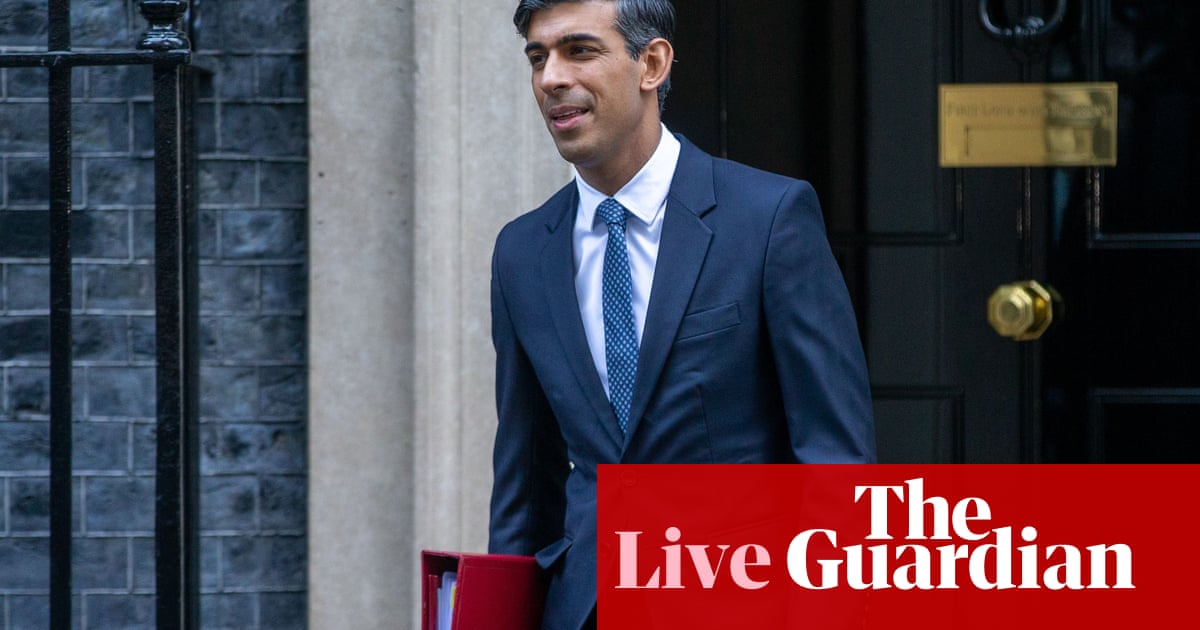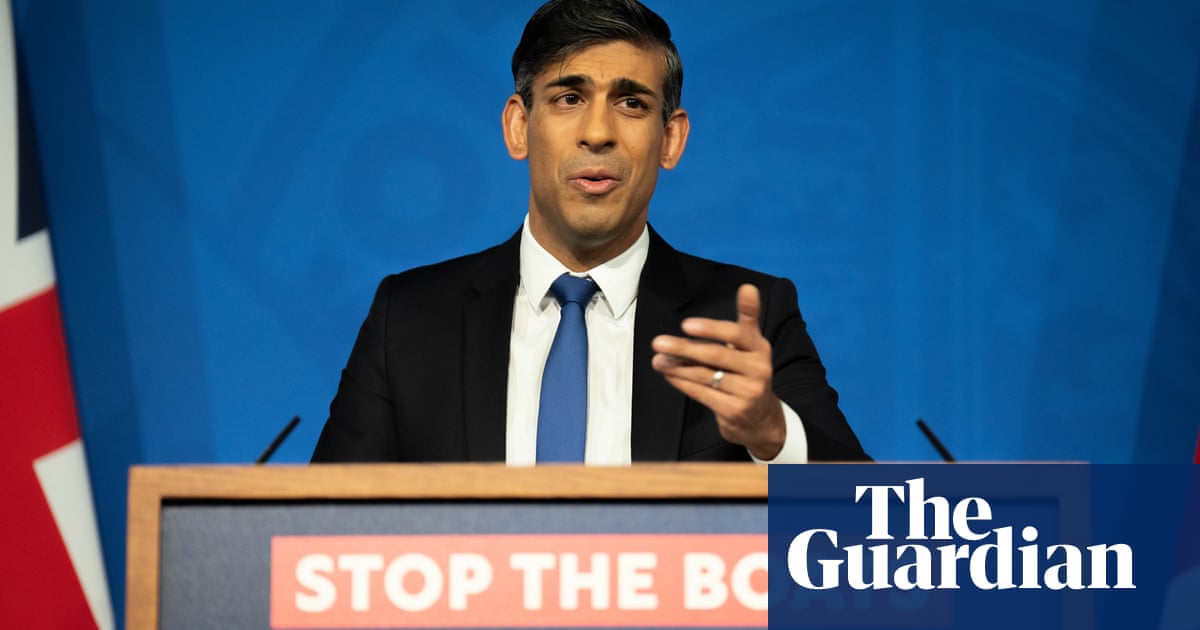
Sunak says Rwanda bill will make prospect of courts blocking any deportation decision "vanishingly rare"
Sunak says he did not agree with the supreme court’s judgment, but he respects it.
The bill will address the concerns it has. The supreme court was commenting on conditions in Rwanda 18 months ago, he says.
The bill includes notwithstanding clauses. This means people will not be able to use domestic law to challenge decisions to deport them.
He lists a series of reasons migrants might try to use to challenge a decision to deport them. They have all been blocked.
He says the only challenge that might be allowed would be if someone could prove, with credible evidence, that they were at real risk of harm if they were sent abroad.
He says without this provision, Rwanda would not have agreed to the scheme. And in that case the scheme would have collapsed.
He says this is an “extremely narrow” exception. It means the prospect of a challenge succeeding will be “vanishingly rare”.
(This is the point Chris Heaton-Harris was making this morning – see 10.40am.)
UPDATE: Sunak said:
That means that this bill blocks every single reason that has ever been used to prevent flights to Rwanda from taking off.
The only, extremely narrow exception will be if you can prove with credible and compelling evidence that you specifically have a real and imminent risk of serious and irreversible harm.
We have to recognise that as a matter of law – and if we didn’t, we’d undermine the treaty we’ve just signed with Rwanda.
As the Rwandans themselves have made clear, if we go any further the entire scheme will collapse.
And there’s no point having a bill with nowhere to send people to.
But I am telling you now, we have set the bar so high that it will be vanishingly rare for anyone to meet it.
Afternoon summary
Rishi Sunak has vowed to “finish the job” of getting his Rwanda plan off the ground as he batted away questions about his future and fought to regain control of his mutinous party.
The former home secretary Suella Braverman has denied spreading poison within her own party to get rid of Rishi Sunak.
Boris Johnson said there was nothing he could have reasonably done to stop lockdown-breaking parties in Downing Street, calling media coverage and TV adaptations of these events “absurd” and “a travesty of the truth”.
Boris Johnson has told the Covid inquiry that he assumed Rishi Sunak’s flagship “eat out to help out” hospitality scheme had been cleared by government scientists and was surprised to learn later that it had not.
Russian spies have been targeting British MPs, peers, civil servants, journalists and others with cyber-hacking since 2015 as part of a concerted attempt to meddle in British politics, a Foreign Office minister has said.
The Conservatives raised three times as much as Labour in the last quarter boosted by £10m from the will of supermarket tycoon John Sainsbury, showing they are on course to benefit from No 10’s decision to raise election spending limits.
The BBC’s governing body has said the UK’s creative sector will be hit by the government’s decision to limit the expected licence fee increase to £10, after the culture secretary confirmed a below-inflation rise.
David Cameron has said that American lives could be at stake if the US Senate does not approve more military aid to Ukraine. As the BBC’s James Landale reports, he made the comments in a speech in Washington, where the Senate is blocking a further financial aid package.
In a thread starting here, Landale says Cameron, the new foreign secretary, said supporting Ukraine was in America’s self-interest.
UK Foreign Secretary @David_Cameron makes a punchy intervention in US domestic politics. On a visit to Washington, he tells policymakers American lives could be at risk if they do not vote through new money for Ukraine. This only hours after the Senate blocked £61bn for Kyiv.
He told the Aspen Security Forum he was “worried” the US and the West were not giving Ukraine the support it needed against invading Russian forces & said they had to help Ukraine through the winter so it could rebuild in the spring.
“Anything less than that is a victory for Putin,” Lord Cameron said. “If we let him win in Ukraine, it will be somewhere else next and it won’t just be American money that’s at risk. It might be a Nato country so it could be American lives.”
He added: “If that money doesn’t get voted through, there are only two people that will be smiling. One of them is Vladimir Putin in Russia. The other one is Xi Jinping. And I don’t know about you but I don’t want to give either of those people a Christmas present.”
Lord Cameron challenged and rejected arguments made by some Republican senators, namely that Ukraine’s military campaign was failing, that Europe was not pulling its weight, that the strategy was not clear enough and that Ukraine was corrupt.
He said Ukraine had sunk 1/5th of Russia’s Black Sea fleet, European countries were giving twice as much support as the US, the strategy was to back Ukraine through the winter & rebuild in the spring & Ukraine now had tougher anti-corruption laws than both US & the UK.
In an article for the Guardian, Henry Hill, the deputy editor of the ConservativeHome website, argues that one reason why Rishi Sunak is focusing on small boats is because the Tory record on overall immigration is so poor. Hill argues:
When James Cleverly, the home secretary, claims that the government’s latest proposals will cut immigration by 300,000, that huge number won’t even take the annual inflow back to where it was when the Conservatives first entered government.
This is why Sunak keeps focusing on Rwanda, and the broader question of asylum, despite the enormous difficulty the government is having getting the scheme off the ground: to try to use it as a shorthand for being “tough on immigration”, without having to admit that since 2019 the Conservatives have been running perhaps one of the most laissez-faire immigration policies in modern British history.
This problem predates Sunak. But the fact is that that neither he nor his predecessors wanted to confront the hard choices that reducing the UK’s reliance on imported labour would entail. They have instead repeatedly talked tough, and installed a rightwinger at the Home Office with the impossible task of sorting the issue out, while allowing other departments such as education, business, and the Treasury to keep pushing policies that drive the numbers ever higher …
Focusing on the troubled Rwanda scheme is the closest Sunak has got to answering an impossible question: how do you campaign on being tough on immigration when your record says the opposite? I suspect that next year he will learn the hard truth: you can’t.
While it is Conservative MPs whose positions will determine the fate of Sunak’s legislation, the views of the party’s membership, who have tended to be more rightwing than those in parliament, is harder to quantify
Paul Goodman, the editor of ConservativeHome, said a survey which the website had carried out in July found seven out of 10 Conservative activists believe the UK should leave the European convention on human rights. He said:
In terms of how they feel about this legislation now, a certain amount depends on what positions they see Eurosceptics they support taking. Though her support among MPs may be limited, some members will look for a lead from Suella Braverman, although the picture there is also complicated.
When members were surveyed on whether Sunak was right to sack her as home secretary, half said he was wrong but two in five said he was right, which is a substantial minority.
The Conservative party chair, Richard Holden, told reporters at a press gallery lunch his party still has a “fighting chance” of winning the next general election. He said:
I wanted to come in here today to tell you and especially my colleagues in the room, that the fight is not over, despite what Labour seem to think …
Our opponents may think it is a forgone conclusion and try to keep their heads down because whenever they put them up, they make a mistake. But it’s clear to me that the fight isn’t over and it has a few facets to it.
Holden criticised Keir Starmer for making a number of U-turns and not standing up to Jeremy Corbyn when antisemitism was at its peak in the party.
On Starmer’s praise for Margaret Thatcher, Holden said the “public see him as a shapeshifting child. A major issue for him is that he means to stand for something that he can’t stand for.”
The Tory chair also said his party would be ready for a general election from February 2024.
Northern Research Group Tories likely to support Rwanda bill, says its chair
The chair of an influential group of Conservative MPs who include many from “red wall” constituencies said he believes they would support Rishi Sunak’s Rwanda legislation.
John Stevenson, the Carlisle MP who chairs the Northern Research Group, said:
I think that it will be overwhelmingly supported by northern MPs. Some may have wanted it to be more robust but I think that most will support it and I would be surprised if anybody went against it.
Immigration a big issue in all of seats in the north of England and I view this as another stage in the government approach, so let’s bring forward the legislation. My attitude is that if it doesn’t work then you would need to revisit the whole issue.
Osborne floats theory Boris Johnson not fully focused on Covid in early 2020 because he was dealing with big tax bill
George Osborne has suggested that one reason Boris Johnson was not fully focused on Covid in early 2020 was because he was working out how to pay off a big tax bill.
The former Tory chancellor floated the theory, without offering any firm evidence to back it up, on his Political Currency podcast which he co-hosts with Ed Balls. Osborne and Johnson have a rivalry dating back to the time when they were both seen as likely successors to David Cameron as prime minister, and Johnson’s successful leadership of the leave campaign in 2016 in effect killed off Osborne’s political career.
In February 2020 Johnson spent a long period at Chevening, a government grace-and-favour country home, while Chequers was being refurbished. In his witness statement to the Covid inquiry, Dominic Cummings, Johnson’s former chief adviser, said Johnson was “on holiday for a fortnight” dealing with his divorce, the announcement of his engagement, and accusations about him in the media from an ex-girlfriend. Cummings also said Johnson wanted to work on his Shakespeare biography.
Johnson’s allies have dismissed the Shakespeare book claim, and at the Covid inquiry yesterday Johnson said he was holding some work meetings during the Chevening period. But the former PM has not given a full account of how he spent that time.
Osborne said on his podcast:
I think he [Johnson] hits a kind of financial crunch in early 2020. Because he’s basically taken the job of prime minister, which is a big pay cut for him. He has a big tax bill to pay, because he was giving speeches for money in that period between when he was foreign secretary and prime minister. And he wouldn’t have put aside money to pay HMRC a few years later …
Because he’s bust he can’t deal with Covid. That is a theory about what happened in February. It didn’t really surface, put it this way, at the Covid inquiry, but it’s a personal pet theory of mine of why he disappears in February.
In response, a spokesperson for Johnson said:
This is total and transparent nonsense and is also in contradiction of the evidence which was presented at the inquiry; it shows that Mr Johnson was working in this period, including attending meetings in person in Downing Street, receiving box work and taking part in Covid-relevant discussions.
Tory civil wars have “completely reopened”, George Osborne has claimed.
Speaking on his Political Currency podcast, which he co-hosts with Ed Balls, the former Tory chancellor said the events of this week had undermined Rishi Sunak’s claim to be a force for stability.
Osborne said:
The Tory civil wars have completely reopened. Rishi Sunak’s big claim was, ‘I’ve come after the chaos of Boris Johnson and the chaos of Liz Truss … I’ve stabilised things.’
He can’t now claim anymore to have stabilised things. His government is fragmenting around this immigration issue.
Osborne also said he did not think that Robert Jenrick’s decision to resign yesterday was just motivated by a dispute over policy. “You’ve got to be thinking he’s also positioning himself for what’s going to come in the Tory party,” Osborne said.
One group of lawyers inspecting Rishi Sunak’s Rwanda legislation are expected to return their judgment to rightwing Consevative MPs before Tuesday’s vote, PA Media reports. The European Research Group (ERG) chair and MP Mark Francois said:
We all agree with the prime minister that we need to stop the boats but the legislation to do this must be assuredly fit for purpose.
To that end, spoke with Sir Bill Cash, who confirmed his star chamber team are already analysing the Rwanda bill, in detail.
This may still take a few days to complete but he was confident their findings will be available, at the very latest, prior to the second reading debate on Tuesday.
The New Conservatives and Common Sense groups are also interested in the verdict, PA says.
When Rishi Sunak became Conservative leader, he was significantly more popular with the public than his party. A big question in politics was whether he would drag his party up (with people taking a more positive view of the Tories, because Sunak was leading them), or whether the opposite would happen.
Now the answer is clear. As new polling from Ipsos confirms, being Tory leader seems to have had a dire impact on Sunak’s popularity.
Keiran Pedley, director of politics at Ipsos, said:
At the start of the year the prime minister’s personal poll ratings were stronger than his party’s. In January, Rishi Sunak held a net favourability rating of -9 whilst the Conservative party stood at -26. Today Mr Sunak’s stands at -28 and the Conservative party -33. A year of public concern about the cost of living, NHS and immigration now mean Mr Sunak is almost as unpopular as the party he leads as he grapples with how to turn their collective fortunes around in 2024.
New from @IpsosUK. 2023: The year Rishi Sunak became (almost) as unpopular as his party
Net favourability
Jan 2023
Sunak: -9
Conservatives: -26
November 2023
Sunak: -28
Conservatives: -33












